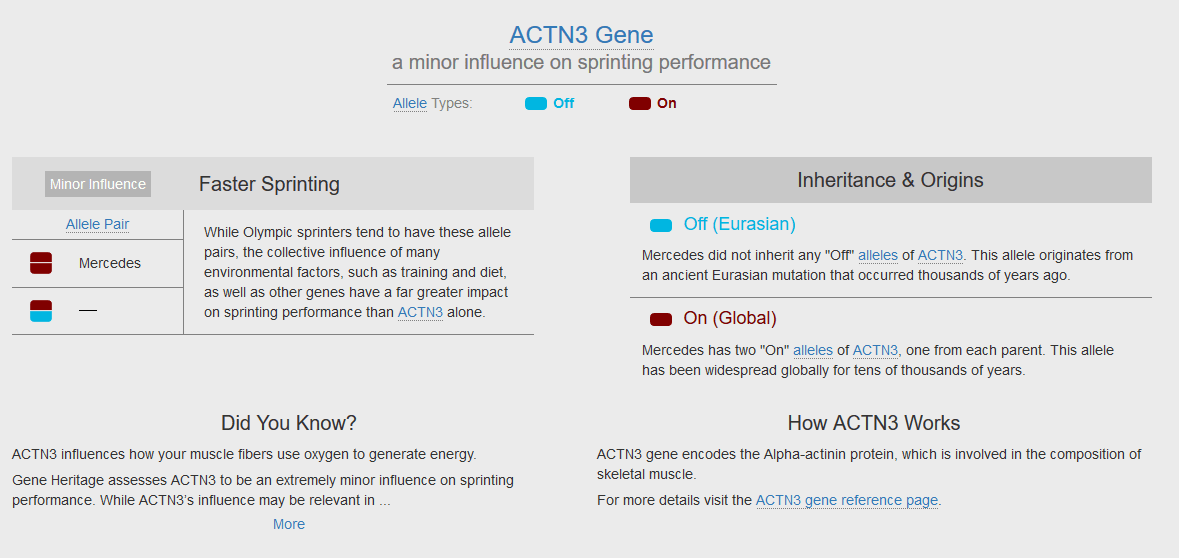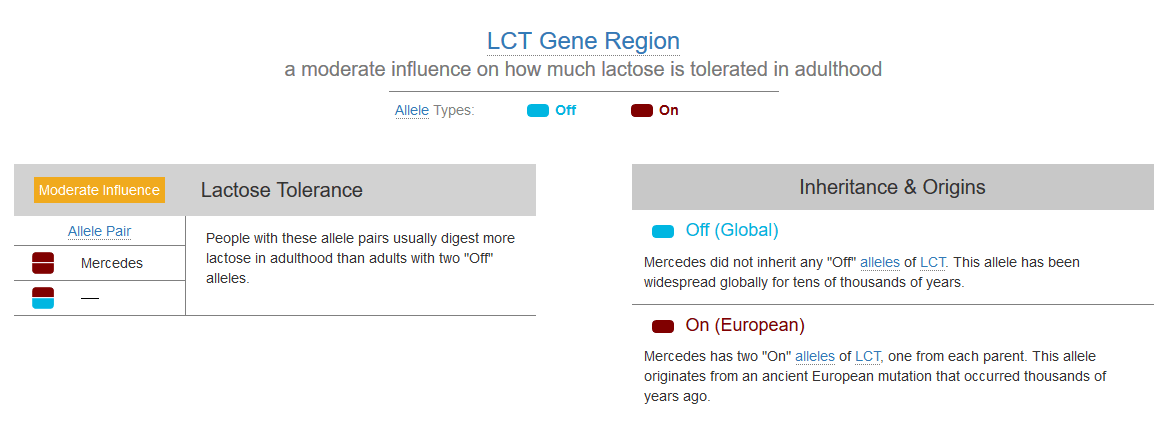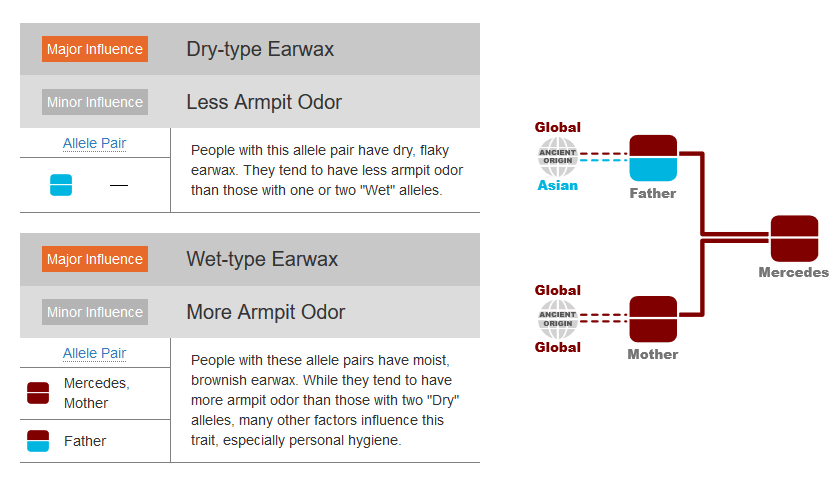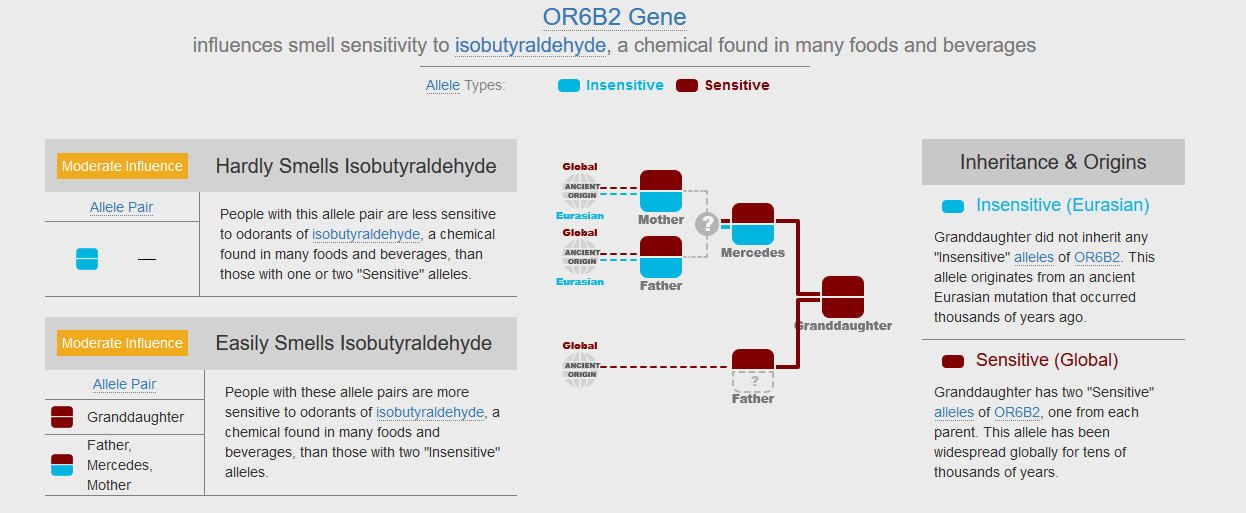Gene Heritage was a company that used your existing DNA test to determine if you inherited certain genes from your parents that influence whether or not you display particular characteristics. The company is no longer operating.
Some of the genes/alleles that they checked for were lactose intolerance, taste sensitivities, eye color, how well you might do as a sprint athlete, and whether or not you have bad body odor when you sweat.
If your children, parents, or grandparents have done DNA tests, you could also learn how different traits were passed down through the generations.
In this post, I'll show you specific examples from my own Gene Heritage report, answer some basic questions, as well as:
- Explain how Gene Heritage was used
- Tell you what you could learn from your Gene Heritage Results
- Show you examples from individual, parent/child, and grandchild reports
My family had a lot of fun with our Gene Heritage results, and it's something I can get everyone interested in. Not everyone in my family is into genealogy, and I can see their eyes start to glaze over if I bring up DNA. Everyone wants to know whether their earwax smells, or whether or not its in their genes to be able to sprint better, however, so it's been a way to get everyone interacting with their DNA.
Note: This article was completely updated on November 5, 2023 in order to reflect that the company is no longer in operation. The article is still available for those people who may have used the service.
How much did Gene Heritage cost?
My favorite part about Gene Heritage that it was a pretty inexpensive tool to help us learn about what traits our DNA shows and how they were inherited. It was only $8 per family member.
What can a Gene Heritage report tell you?
Gene Heritage reports examined your DNA for fourteen traits that have extensive research linking them to a specific gene or gene region and whether or not you are likely to display a particular trait.
Some of the coolest (in my opinion) traits on the report were:
- Which eye color genes you inherited (dark or light)
- If you might be a good sprinter
- Whether you are lactose intolerant
- Whether broccoli tastes bitter to you
- Whether your face flushes if you drink alcohol
- The color of your earwax and how bad your body odor is likely to smell
I don't want to bore you with too many of my results, so I chose only a few to use as examples.
Gene Heritage could tell you whether you might be a good sprinter
Take as an example the the ACTN3 gene, which is located on Chromosome 11. This gene has been shown to be directly related to the makeup of your skeletal muscle - and how fast you are likely to be able to sprint. Each person will typically inherit two alleles (alternative forms of a gene) of this gene, but they could be switched "on" or "off". If you inherit two alleles that are switched on, then you might be able, with some training and conditioning, to be a fast sprinter!
Below, you can see that I inherited two copies of the "on" allele for this gene. I got one from each of my parents - cool! I suppose that this means that I could be a good runner. Hmmm... I did do a brief stint on the track team during elementary school. This almost inspires me to get to the gym more often.

Your Gene Heritage report can tell you whether you are likely to be lactose intolerant
I already knew that I am not lactose intolerant, since I am unlikely to be able to survive without cheese (I'm only slightly overstating this). It was cool, however to see this in black and white, or in blue and red, rather, on a report based on my individual, unique DNA.

Is there a way to find out which traits I inherited from each of my parents?
Oh. My. Goodness. This was actually my favorite part of the service. I know that not everyone had access to their parents' DNA to be able to run this report, but for those of you who did, this was a super fun thing to do, and would make for great conversation during family gatherings.
For example, if you were curious about which parent passed down the gene that makes you likely to have somewhat smellier armpit odor, look no further. You could have upgraded your Individual Report to a Parent/Child report, upload your parents' DNA files, and find out which alleles were passed down to you by which parent. In my case, I can thank both of my parents for passing down the "wet earwax" allele, which coincidentally is also linked to more armpit odor.

It looks like my dad had one of each allele - but he happened to pass down the wet-type earwax one to me, and of course, it matched up with the one that I got from my mother.
Gene Heritage can help you visualize how much DNA you inherited from your grandparents
I was able to obtain a Grandchild report, which analyzed my daughter's DNA as it relates to my own and my grandparents. In the Grandchild Report, it traced how the traits that they check for are passed down from grandparents to child to grandchild. It was very easy to understand the results, and you could upload as many DNA files as you have access to. Theoretically, if you had DNA files for all four grandparents, as well as both parents, you could have seen exactly from whom each allele was inherited to complete the grandchild's predisposition (or lack thereof) for a particular trait.
My favorite example from my daughter's Grandchild report is the part explaining that my daughter has two alleles of OR6B2, which might make her more sensitive to isobutyraldehyde. Isobutyraldehyde is a chemical found in lots of food and drinks, including celery. My daughter is highly sensitive to the smell of celery, and it has always driven me crazy because I love the smell and taste.
We can see very clearly in this Grandchild Report (in the image below) that I inherited a sensitive allele from my mother and a non-sensitive allele from my father, which means that I am also likely to be more sensitive to the chemical isobutyraldehyde. I passed down the sensitive allele that I got from my mother to my daughter. She got one from her dad, too, and thus, possibly, her sensitivity to the smell of celery (and maybe other foods containing this chemical).
Gene Heritage notes that being more sensitive to isobutyraldehyde doesn't necessarily mean that you are guaranteed to dislike it. Maybe it just smells stronger to us, and whether or not we like or dislike the smell is due to our own personal experiences with the foods that contain the chemical.

Does Gene Heritage collect DNA samples?
Gene Heritage did not actually collect DNA samples. Instead, you uploaded your "raw" DNA file from your testing company (Ancestry DNA, 23 and Me, Family Tree DNA, Living DNA, My Heritage DNA). This means that in order to use Gene Heritage, you will need to have tested your DNA with one of the companies that I just listed.
If you haven't already tested your DNA, be sure to check out my post titled, "The Beginner's Guide to DNA Testing: The Ultimate Strategy". Once you order your test, you'll be well on your way to being able to use Gene Heritage.
How to use Gene Heritage
Gene Heritage is no longer in operation, so it is not possible to obtain any of the reports mentioned in this article. This article is meant for those people who may have used the service and saved their reports on their computer.
Conclusion
In the spirit of full disclosure, I always let you guys know what my relationship is with the companies that I write about. I was supplied a complimentary Individual Report, Parent/Child Report and Grandchild Report by Gene Heritage so that I could examine my own results and let my readers know about my experience. With that said, I won't get any commissions or earn any money from Gene Heritage for writing this post.
I enjoy trying out new services, tools, and websites, and really enjoy telling my readers about my experience. Gene Heritage is one of many places where you can upload your DNA, a neat benefit of having done an autosomal DNA test.
I hope that this post helped you understand the basics of Gene Heritage, including what kind of information they can tell you about your own DNA. If you have any questions or comments, or want to share your own experience with what you learned from your reports, I would love to hear from you in the comments.
Thanks for stopping by!

